语法精析第六讲动词(一)动词的分类
图片预览
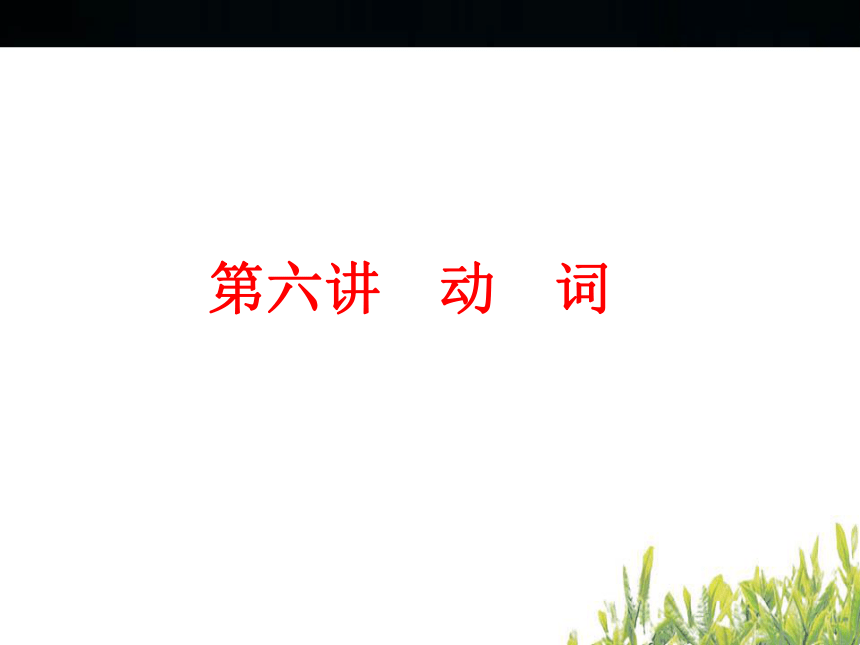
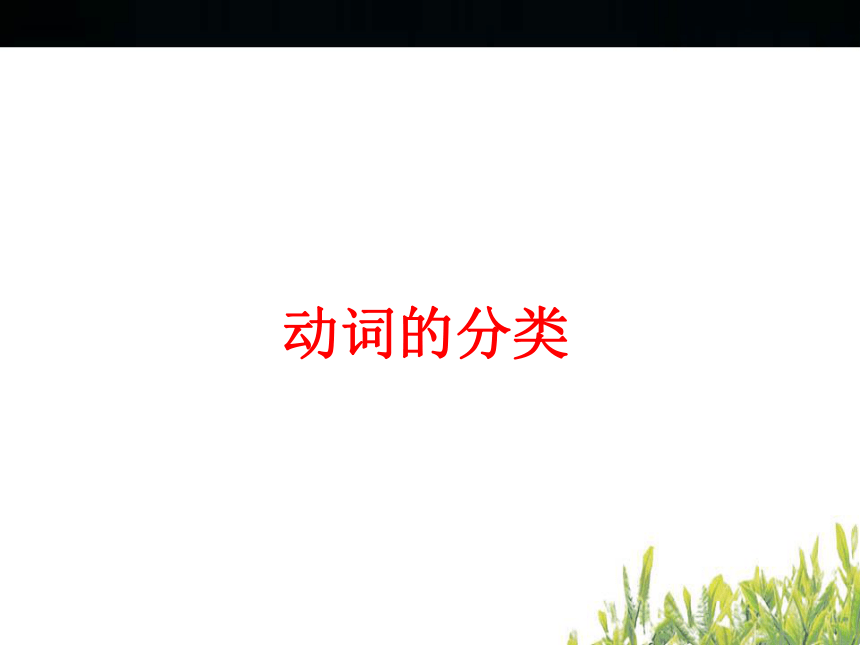
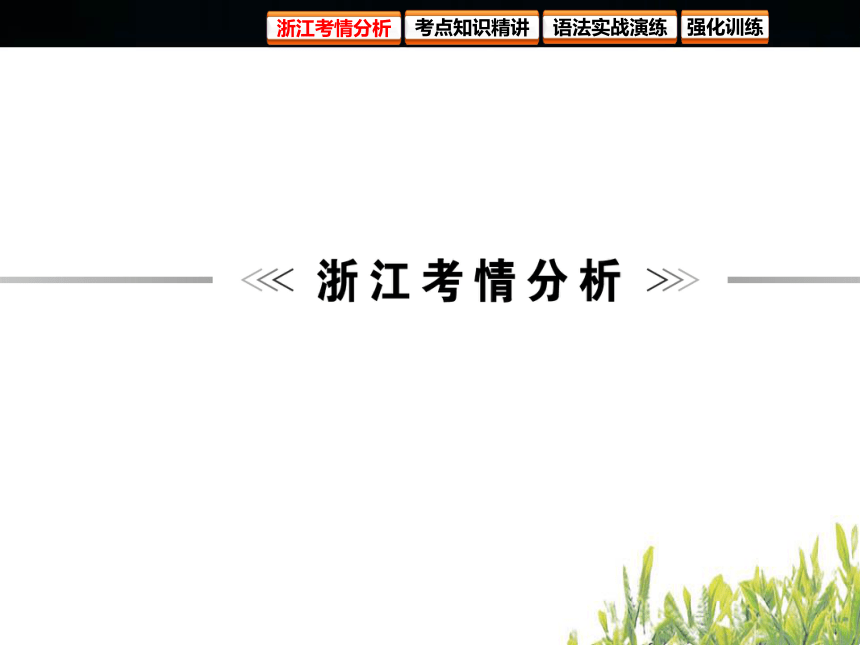
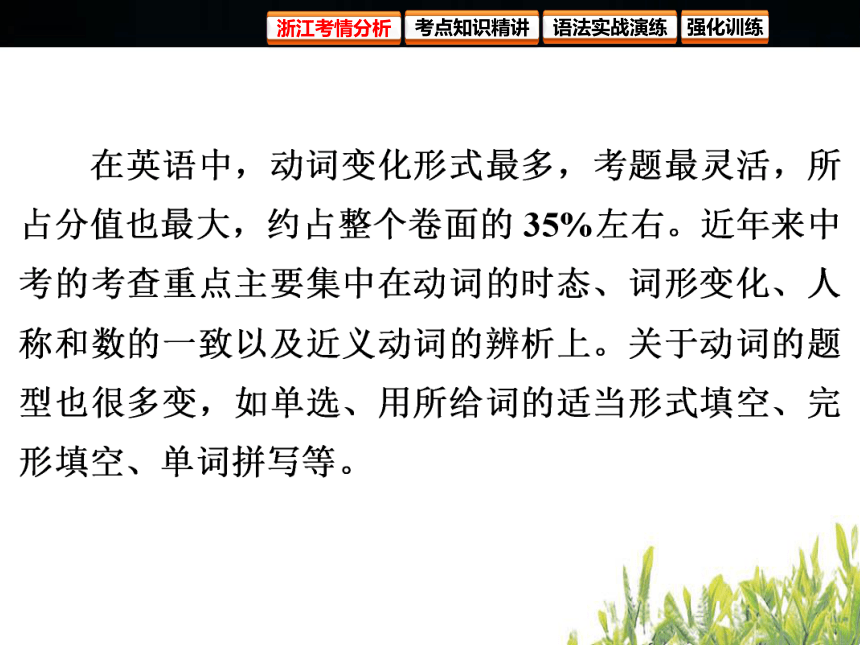
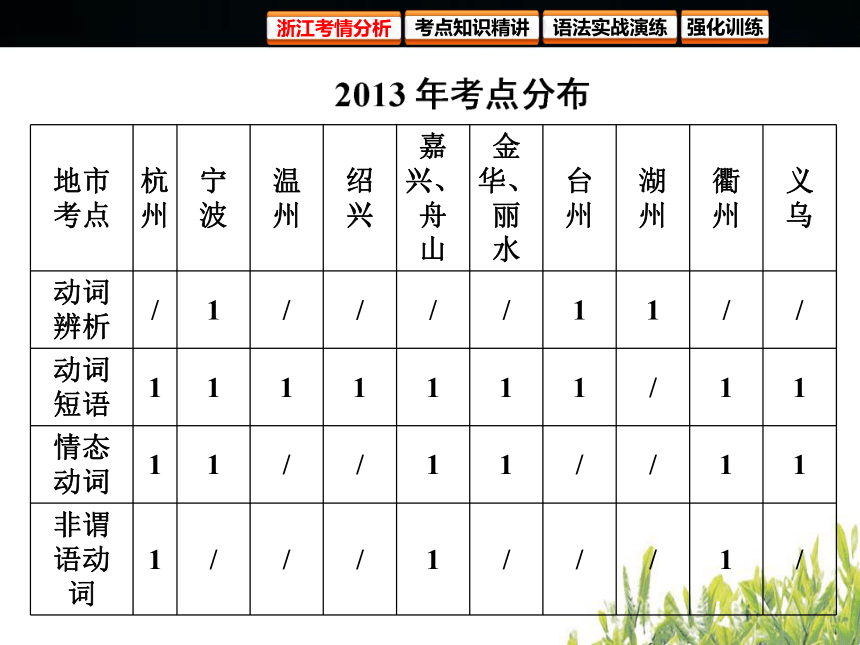


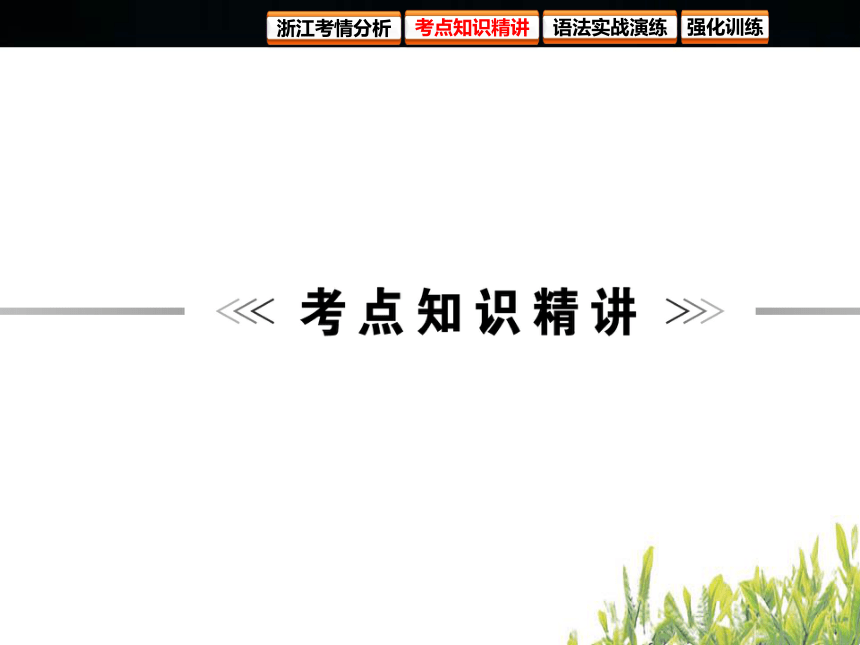
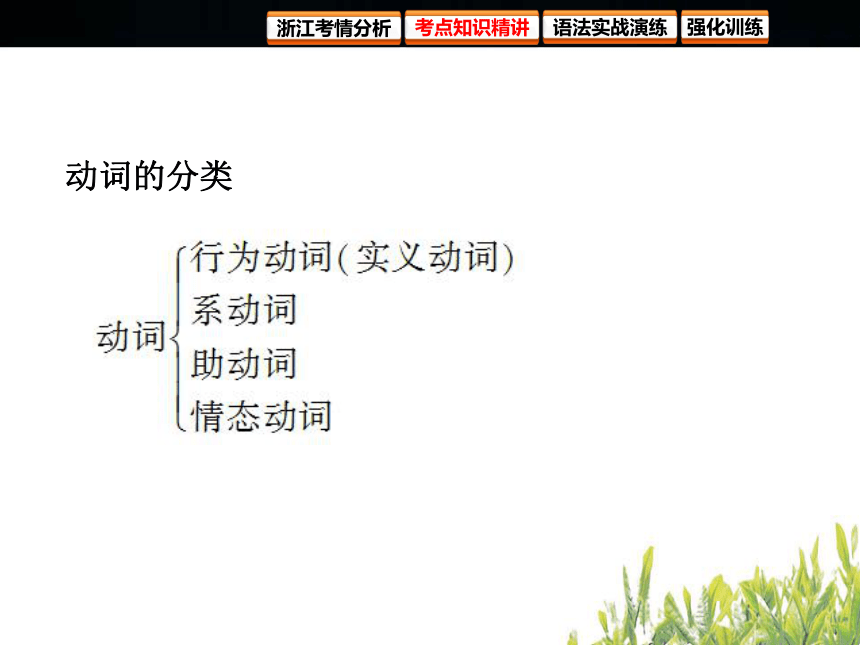
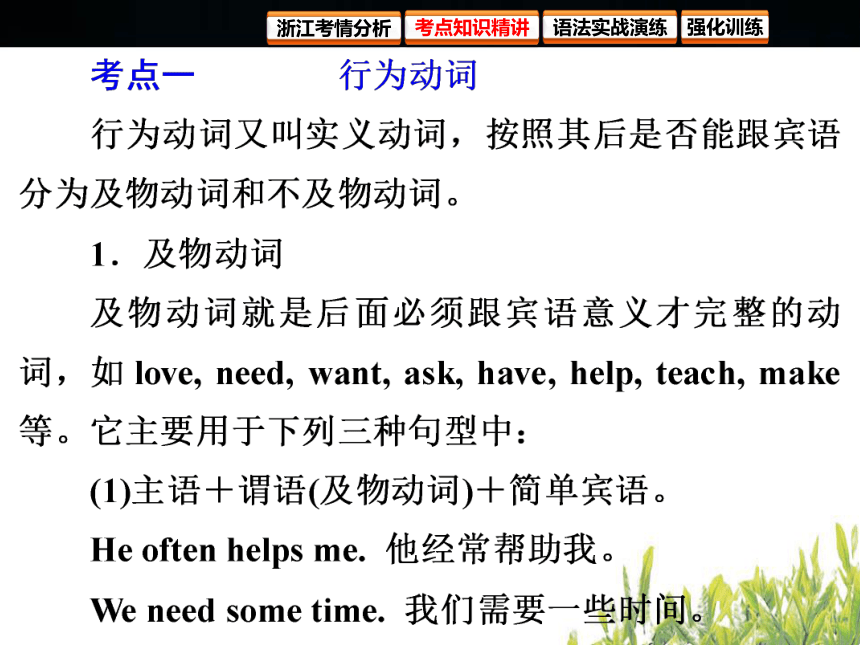
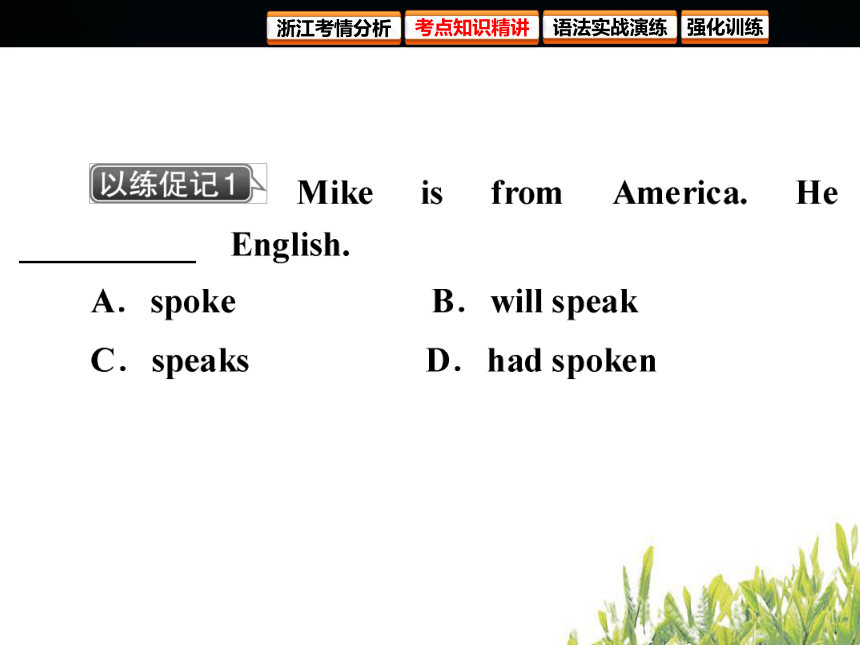
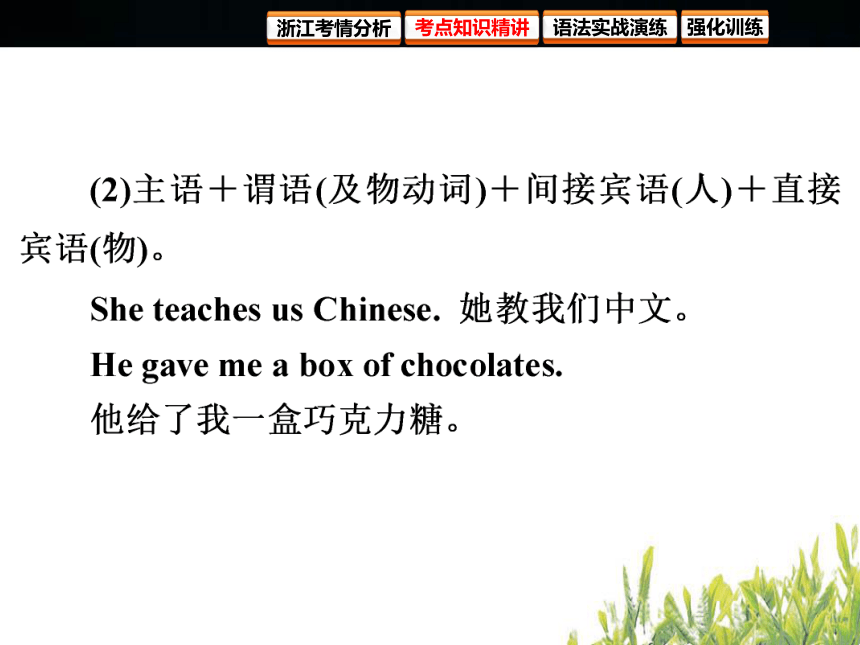
文档简介
课件127张PPT。第六讲 动 词
动词的分类动词的分类 注意 有的动词有时作及物动词,有时作不及物动词,区分它们是及物还是不及物要看其后是否直接跟宾语。
He lives in Beijing. 他住在北京。
解析:live后面没有宾语,故live用作不及物动词。
He lives a happy life. 他过着幸福的生活。
解析:live后面有宾语a happy life,故live用作及物动词。
1.(2013·青岛)—You look sad. What has happened?
—Everyone ________ us to win the match, but we lost.
A.expects B.expected
C.hopes D.hoped
解析:考查动词辨析。句意为“你看起来很难过,发生什么事了?”“每个人都盼望着我们比赛获胜,但我们输了。”可以说expect sb. to do sth.不能说hope sb. to do sth.,由lost可知用过去式,故答案为B项。
答案:B2.If you eat bad food, you ________ ill.
A.may be B.can't be
C.must D.maybe
解析:考查情态动词用法。may为情态动词,后加动词原形;maybe为副词,意为“大概,也许”,主句缺少谓语动词,故选A。
答案:A
3.(2013·安徽)The people in Ya'an have met lots of difficulties, but they haven't ________ hope.
A.picked up B.given up
C.looked for D.waited for
解析:考查动词短语辨析。句意为“雅安人民遇到了很多困难,但是他们从没放弃希望”。pick up“拾起,拿起”;give up“放弃”;look for“寻找”;wait for“等,等待”。根据句意可知选B。
答案:B4.(2013·山西)In April, the weather in some places in Shanxi was really changeable. People still remember they have ________ four seasons in a week.
A.organized B.experienced
C.described
解析:句意为“在四月,山西一些地方的天气真的是变化无常。人们仍然记得他们一周内经历了四个季节”。organize“组织”;experience“经历”;describe“描述”。由句意可知选B项。
答案:B5.—Why do you want to stay at home?
—Because I ________ good when I am with my family.
A.smell B.feel C.taste D.sound
解析:考查系动词辨析。句意为“你为什么想待在家里?”“因为我感觉和家人待在一起很好。”smell“闻起来”;feel“感觉,觉得”;taste“尝起来”;sound“听起来”。故选B。
答案:B6.A concert will be held to ________ money for homeless people.
A.collect B.give up
C.send D.spend
解析:句意为“为了给无家可归的人筹款,将会举办一场音乐会”。collect“收集,募集”;give up“放弃”;send“送”;spend“花费”。根据题意选A。
答案:A7.(2013·天津)He ________ an English club last year and has improved his English a lot.
A.protected B .produced
C.joined D.received
解析:句意为“去年,他参加了一个英语俱乐部,他的英语已经提高了许多”。protect“保护”;produce“生产”;join“参加”;receive“收到”。由句意可知选C项。
答案:C8.(2013·重庆)Oh, it ________ so nice. What beautiful music it is!
A.smells B.sounds
C.tastes D.looks
解析:考查系动词。句意为“哦,它听起来是那么好听。多美妙的音乐啊!”由句中的music可知应用sounds(听起来)。故答案为B项。
答案:B9.(2013·青岛)—Do you know why he didn't ________ a word when he ________ to?
—Because he was too nervous.
A.speak; speaks B.say; was spoken
C.say; spoke D.speak; is spoken
解析:考查动词辨析和时态。句意为“你知道吗?当别人和他说话时他一言不发。”“因为他太紧张了。”say意为“说,讲”,着重说话的内容,符合语境;speak指说某种语言。第二空表示“别人和他说话”,因此,he与speak之间存在被动关系;由“he didn't”可知,时态为一般过去时,因此,第二空应用一般过去时的被动语态。故选B。
答案:B10.(2013·河南)If you want to change the world, you have to ________ yourself first.
A.enjoy B.check C.help D.change
解析:考查动词辨析。句意为“如果你想改变这个世界,首先你不得不改变你自己”。enjoy“享受”;check“检查”;help“帮助”;change“改变”。根据语境中的change the world和first可知答案为D项。
答案:D11.(2013·烟台)My bike is broken. Could you help me to ________?
A.fix it up B.set it up
C.make it up D.put it up
解析:考查动词短语的辨析。句意为“我的自行车坏了,你能帮我修一下吗?”fix up“修理”;set up“建立,设立”;make up“组成”;put up“张贴”。根据句意可知答案为A。
答案:A12.(2013·江西)Anna is going on a tour of Xi'an, and she wants to ________ Chinese history.
A.dream of B.learn about
C.look through D.pass on
解析:考查动词短语辨析。句意为“Anna打算去西安旅行,她想了解中国历史”。dream of“梦想”;learn about“了解”;look through“浏览”;pass on“传递”。根据句意可知答案为B项。
答案:B13.You ________ wear sports shoes when you climb a mountain.
A.can't B.shouldn't
C.mustn't D.have to
解析:考查情态动词用法。have to=must“必须,不得不”。
答案:D
14.The baby feels ________ while his mother holds him in her arms.
A.save B.safe C.safely D.safety
解析:句意为“婴儿的妈妈用胳膊抱着他的时候,他感到安全”。save动词,意为“节省”;safe形容词,意为“安全的”;safely副词,意为“安全地”;safety名词,意为“安全”。feel是感官动词,后常接形容词构成系表结构。故选B。
答案:B15.To protect the environment, supermarkets don't ________ free plastic bags for shoppers.
A.take B.show
C.provide D.carry
解析:句意为“为了保护环境,超市不给购物者提供免费的塑料袋”。take“带走”;show“展示”;provide“提供”;carry“运送”。根据句意可知答案为C项。
答案:C强化训练 6 动词的分类1.(2013· 安徽)I will meet Jane at the station. Please________ what time she will arrive.
A.count B.choose C.check D.catch
解析:考查动词词义辨析。count“计算”;choose“选择”;check“核对,查对”;catch“抓住”。由句意可知选C。
答案:C
2.(2013·上海)—Must I go to medical school and be a doctor like you,Dad?
—No, you________, son.You're free to make your own decision.
A.can't B.mustn't C.shouldn't D.needn't
解析:考查情态动词的用法。must引导的问句的否定答语要用needn't。故选D。
答案:D
3.(2013·连云港)—Would you please see the film Iron Man 3 with me tonight, Kate?
—I'd love to, but I've________ Linda's invitation to dinner.
A.suffered B.earned
C.received D.accepted解析:考查动词词义辨析。suffer“遭受”;earn“获得”;receive“收到”;accept“接受”。根据but可知,已经接受了赴宴的邀请。accept an invitation“接受邀请”,故选D。
答案:D
4.The roof of the house needs repairing.It's raining now, you'd better get something to________ rain drops.
A.control B.cover C.carry D.catch
解析:考查动词辨析。catch rain drops“接住/装雨水”,符合语境。故选D。
答案:D
5.(2013·武汉)—What does the instruction say?
—The colors in the dress will ________ if you use hot water.
A.fall B.appear C.run D.shine
解析:fall“掉下;落下”;appear“显现;出现”;run“跑;褪色”;shine“发光;闪耀”。根据生活常识可知,有些衣服如果用热水洗会褪色。故选C。
答案:C6.—I won't have time to go shopping with you this afternoon.
—But you________ me yesterday.
A.ordered B.mentioned
C.promised D.knew
解析:考查动词辨析。order“命令”;mention“涉及”;promise“许诺”;know“知道”。根据转折词But可知,此处表示“你昨天许诺了要和我一起去购物”,故选C。
答案:C7.(2013·菏泽)—Why do you collect so many old bikes?
—I'll have them________and give away to the children who don't have bikes.
A.used up B.given up
C.fixed up D.set up
解析:考查动词短语辨析。use up“用尽”;give up“放弃”;fix up“修理”;set up“建立”。句意为“我将让人修理它们并送给那些没有自行车的孩子”。have sth. done 表示“让别人做某事”,故选C。
答案:C
8.(2013·广东)Again and again the doctor________ the crying baby girl, but he couldn't find out what was wrong with her.
A.looked over B.looked after
C.looked for D.looked out
解析:考查动词短语辨析。look over“检查,查看”;look after“照顾”;look for“寻找”;look out“小心,当心”。由句意可知选A项。
答案:A9.(2013·莱芜)The little boy ________ his seat to an old lady on the crowded bus.
A.lent B.offered C.took D.brought
解析:考查动词辨析。lend“借(出)”;offer“给予”;take“带(走)”;bring“带(来)”。句意为“在拥挤的公共汽车上这个小男孩主动将座位让给一位老太太”。故选B。
答案:B
10.—Do you have Jay's CDs?
—Sorry, they are ________.But we'll get some more next week because they ________.
A.sold well; are on sale B.sold out; sell well
C.selling well; sell well D.for sale; sell well
解析:考查固定词组搭配。sell out“卖完”,可以用被动语态;sell well“畅销”,不能用被动语态。句意为“你有Jay的唱片吗?”“对不起,已经卖光了。但是我们在下周将再进一些来,因为很畅销”。故选B。
答案:B
11.(2013·济宁)—Do you know the price of the ticket?
—Yes. Each ________ ¥ 180.
A.pays B.costs C.takes D.spends
解析:pay“花费(金钱)”,主语是表示人的词语;cost意为“花费”时,主语必须是表示物的词语;take一般情况下指“花费时间”,多用it作形式主语;spend意为“花费”时,主语是表示人的词语。主语each代指ticket,表示物,因此只能用cost。故选B。
答案:B12.—What smells terrible, Ted?
—I'm sorry.I'll________ my shoes and wash them at once.
A.take away B.give away
C.move away D.get away
解析:考查动词短语辨析。take away“拿走”;give away“分发,泄露”;move away“移动”;get away“离开”。根据“什么闻起来这么难闻”以及“I'm sorry.”可知,此处表示“我马上把我的鞋拿去洗”,故选A。
答案:A13.After winning the badminton championship at Wuhan Sports Center in May, the Chinese players' faces ________ with joy.
A.made up B.took up C.put up D.lit up
解析:考查动词短语辨析。make up“组成,构成”;take up“占用,开始从事”;put up“张贴,举起”;light up“(使)变得喜悦,(使)兴奋起来”。根据“winning the badminton championship”可知选D。
答案:D14.(2013·襄阳)—Show me your homework, Dave?
—Sorry, Mrs. Brown. I've ________ it at home.
A.missed B.forgotten C.lost D.left
解析:miss“想念”;forget“忘记”;lose“丢失”;leave“忘在……(地方)”。forget常构成forget to do sth.“忘记做某事”,forget doing sth.“忘记做过某事”;leave作“忘记”讲时,多指“把某物忘在某地”。句意为“给我看看你的作业行吗,Dave?”“对不起,布朗太太,我把作业忘在家里了。”结合语境可知选D。
答案:D
15.(2013·菏泽)You are________to type quickly when talking to each other on QQ so the other person doesn't get bored.
A.suggested B.supported
C.taught D.supposed
解析:考查动词词义辨析。suggest“建议”;support“支持”;teach“教”;be supposed to do则表示“应该做某事”,符合句意。
答案:D16.(2013·滨州)—So many problems! I'm tired.
—You should try to________ them by yourself. You are not a child any longer.
A.get into B.get off
C.get on D.get over
解析:考查动词短语辨析。get into“陷入”;get off“下车”;get on“上车”;get over“克服”。“克服困难”应该用get over,故选D。
答案:D17.(2013·重庆)We'll________ an English play “Snow White” during this year's Art Festival.
A.look up B.look out
C.put off D.put on
解析:考查动词短语的辨析。look up“查找”;look out“当心”;put off“推迟”;put on“穿上;表演”。根据句意“表演英语剧”可以判断用put on。故选D。
答案:D18.—________ I swim here?
—I'm sorry.Children ________ swim alone here.
A.Must; can't B.May; must
C.Can; mustn't D.Can't; can
解析:考查情态动词的用法。must“必须”;can“可以”,用于拜托或请求;mustn't“不许”,表禁止;can't“不能”;may“可以”。句意“我可以在这里游泳吗?”“对不起。孩子们不许在这里单独游泳。”问句表示请求,答语表示禁止。故选C。
答案:C
19.—Excuse me, whose Japanese book is this?
—It ________ be Tom's.In our class, only he is studying Japanese.
A.must B.can't
C.would D.can
解析:考查情态动词。根据“In our class, only he is studying Japanese.”可知,日语书一定是汤姆的。must表示肯定推测和判断,意为“肯定,一定”。故选A。
答案:A20.(2013·荆门)—Sam, my iPhone is in my bedroom. Could you ________ it for me?
—No problem.
A.bring B.fetch C.take D.carry
解析:考查动词辨析。take指把东西“从近处带到远处”,bring指把东西“从远处带到近处”,fetch指“去把东西取来”,carry一般指把东西“带走”,且是较重的物品。本题根据句意是“去取来”,所以选择B。
答案:B21.—Mom,must I clean my room now?
—No,you ________.You can do it tomorrow.
A.can‘t B.needn’t
C.mustn‘t D.shouldn't
解析:考查情态动词的用法。英语中,由情态动词must构成的一般疑问句,其肯定回答用Yes,...must.;否定回答用No,...needn't.。由答语中的“No”及“You can do it tomorrow.”可知,此处是否定回答,故选B。
答案:B22.—Is Maria knocking at the door?
—It________ be her.She is in Australia now.
A.may not B.needn't
C.mustn't D.can't
解析:考查情态动词。may不用于否定的推测;needn't“不需要”;mustn't“禁止”;can't表示否定的推测。根据答语“她现在在澳大利亚”可知,此处表示“否定的推测”,意思是“不可能是她”。故选D。
答案:D23.Last year I ________ drive.I used to take the bus.
A.could B.couldn't C.should D.shouldn't
解析:考查情态动词。由“I used to take the bus.”可知,去年“我”不会开车。couldn't意为“不会,不能”,符合语境。故选B。
答案:B
24.Now you ________ stop your car when the traffic lights turn yellow.
A.must B.can't C.might
解析:考查情态动词。句意为“现在,当交通信号灯变成黄色的时候你就必须把车停下来”。must“必须”;can't“不能”;might“可能”。根据句意可知选A。
答案:A
25.—I hear you've got a new iPhone 4S.________ I have a look?
—Yes, certainly.
A.May B.Do
C.Shall D.Should
解析:考查情态动词的用法。请求看对方的手机应该用比较委婉的语气,may在表示许可或请求许可时,语气委婉,故选A。
答案:A
动词的分类动词的分类 注意 有的动词有时作及物动词,有时作不及物动词,区分它们是及物还是不及物要看其后是否直接跟宾语。
He lives in Beijing. 他住在北京。
解析:live后面没有宾语,故live用作不及物动词。
He lives a happy life. 他过着幸福的生活。
解析:live后面有宾语a happy life,故live用作及物动词。
1.(2013·青岛)—You look sad. What has happened?
—Everyone ________ us to win the match, but we lost.
A.expects B.expected
C.hopes D.hoped
解析:考查动词辨析。句意为“你看起来很难过,发生什么事了?”“每个人都盼望着我们比赛获胜,但我们输了。”可以说expect sb. to do sth.不能说hope sb. to do sth.,由lost可知用过去式,故答案为B项。
答案:B2.If you eat bad food, you ________ ill.
A.may be B.can't be
C.must D.maybe
解析:考查情态动词用法。may为情态动词,后加动词原形;maybe为副词,意为“大概,也许”,主句缺少谓语动词,故选A。
答案:A
3.(2013·安徽)The people in Ya'an have met lots of difficulties, but they haven't ________ hope.
A.picked up B.given up
C.looked for D.waited for
解析:考查动词短语辨析。句意为“雅安人民遇到了很多困难,但是他们从没放弃希望”。pick up“拾起,拿起”;give up“放弃”;look for“寻找”;wait for“等,等待”。根据句意可知选B。
答案:B4.(2013·山西)In April, the weather in some places in Shanxi was really changeable. People still remember they have ________ four seasons in a week.
A.organized B.experienced
C.described
解析:句意为“在四月,山西一些地方的天气真的是变化无常。人们仍然记得他们一周内经历了四个季节”。organize“组织”;experience“经历”;describe“描述”。由句意可知选B项。
答案:B5.—Why do you want to stay at home?
—Because I ________ good when I am with my family.
A.smell B.feel C.taste D.sound
解析:考查系动词辨析。句意为“你为什么想待在家里?”“因为我感觉和家人待在一起很好。”smell“闻起来”;feel“感觉,觉得”;taste“尝起来”;sound“听起来”。故选B。
答案:B6.A concert will be held to ________ money for homeless people.
A.collect B.give up
C.send D.spend
解析:句意为“为了给无家可归的人筹款,将会举办一场音乐会”。collect“收集,募集”;give up“放弃”;send“送”;spend“花费”。根据题意选A。
答案:A7.(2013·天津)He ________ an English club last year and has improved his English a lot.
A.protected B .produced
C.joined D.received
解析:句意为“去年,他参加了一个英语俱乐部,他的英语已经提高了许多”。protect“保护”;produce“生产”;join“参加”;receive“收到”。由句意可知选C项。
答案:C8.(2013·重庆)Oh, it ________ so nice. What beautiful music it is!
A.smells B.sounds
C.tastes D.looks
解析:考查系动词。句意为“哦,它听起来是那么好听。多美妙的音乐啊!”由句中的music可知应用sounds(听起来)。故答案为B项。
答案:B9.(2013·青岛)—Do you know why he didn't ________ a word when he ________ to?
—Because he was too nervous.
A.speak; speaks B.say; was spoken
C.say; spoke D.speak; is spoken
解析:考查动词辨析和时态。句意为“你知道吗?当别人和他说话时他一言不发。”“因为他太紧张了。”say意为“说,讲”,着重说话的内容,符合语境;speak指说某种语言。第二空表示“别人和他说话”,因此,he与speak之间存在被动关系;由“he didn't”可知,时态为一般过去时,因此,第二空应用一般过去时的被动语态。故选B。
答案:B10.(2013·河南)If you want to change the world, you have to ________ yourself first.
A.enjoy B.check C.help D.change
解析:考查动词辨析。句意为“如果你想改变这个世界,首先你不得不改变你自己”。enjoy“享受”;check“检查”;help“帮助”;change“改变”。根据语境中的change the world和first可知答案为D项。
答案:D11.(2013·烟台)My bike is broken. Could you help me to ________?
A.fix it up B.set it up
C.make it up D.put it up
解析:考查动词短语的辨析。句意为“我的自行车坏了,你能帮我修一下吗?”fix up“修理”;set up“建立,设立”;make up“组成”;put up“张贴”。根据句意可知答案为A。
答案:A12.(2013·江西)Anna is going on a tour of Xi'an, and she wants to ________ Chinese history.
A.dream of B.learn about
C.look through D.pass on
解析:考查动词短语辨析。句意为“Anna打算去西安旅行,她想了解中国历史”。dream of“梦想”;learn about“了解”;look through“浏览”;pass on“传递”。根据句意可知答案为B项。
答案:B13.You ________ wear sports shoes when you climb a mountain.
A.can't B.shouldn't
C.mustn't D.have to
解析:考查情态动词用法。have to=must“必须,不得不”。
答案:D
14.The baby feels ________ while his mother holds him in her arms.
A.save B.safe C.safely D.safety
解析:句意为“婴儿的妈妈用胳膊抱着他的时候,他感到安全”。save动词,意为“节省”;safe形容词,意为“安全的”;safely副词,意为“安全地”;safety名词,意为“安全”。feel是感官动词,后常接形容词构成系表结构。故选B。
答案:B15.To protect the environment, supermarkets don't ________ free plastic bags for shoppers.
A.take B.show
C.provide D.carry
解析:句意为“为了保护环境,超市不给购物者提供免费的塑料袋”。take“带走”;show“展示”;provide“提供”;carry“运送”。根据句意可知答案为C项。
答案:C强化训练 6 动词的分类1.(2013· 安徽)I will meet Jane at the station. Please________ what time she will arrive.
A.count B.choose C.check D.catch
解析:考查动词词义辨析。count“计算”;choose“选择”;check“核对,查对”;catch“抓住”。由句意可知选C。
答案:C
2.(2013·上海)—Must I go to medical school and be a doctor like you,Dad?
—No, you________, son.You're free to make your own decision.
A.can't B.mustn't C.shouldn't D.needn't
解析:考查情态动词的用法。must引导的问句的否定答语要用needn't。故选D。
答案:D
3.(2013·连云港)—Would you please see the film Iron Man 3 with me tonight, Kate?
—I'd love to, but I've________ Linda's invitation to dinner.
A.suffered B.earned
C.received D.accepted解析:考查动词词义辨析。suffer“遭受”;earn“获得”;receive“收到”;accept“接受”。根据but可知,已经接受了赴宴的邀请。accept an invitation“接受邀请”,故选D。
答案:D
4.The roof of the house needs repairing.It's raining now, you'd better get something to________ rain drops.
A.control B.cover C.carry D.catch
解析:考查动词辨析。catch rain drops“接住/装雨水”,符合语境。故选D。
答案:D
5.(2013·武汉)—What does the instruction say?
—The colors in the dress will ________ if you use hot water.
A.fall B.appear C.run D.shine
解析:fall“掉下;落下”;appear“显现;出现”;run“跑;褪色”;shine“发光;闪耀”。根据生活常识可知,有些衣服如果用热水洗会褪色。故选C。
答案:C6.—I won't have time to go shopping with you this afternoon.
—But you________ me yesterday.
A.ordered B.mentioned
C.promised D.knew
解析:考查动词辨析。order“命令”;mention“涉及”;promise“许诺”;know“知道”。根据转折词But可知,此处表示“你昨天许诺了要和我一起去购物”,故选C。
答案:C7.(2013·菏泽)—Why do you collect so many old bikes?
—I'll have them________and give away to the children who don't have bikes.
A.used up B.given up
C.fixed up D.set up
解析:考查动词短语辨析。use up“用尽”;give up“放弃”;fix up“修理”;set up“建立”。句意为“我将让人修理它们并送给那些没有自行车的孩子”。have sth. done 表示“让别人做某事”,故选C。
答案:C
8.(2013·广东)Again and again the doctor________ the crying baby girl, but he couldn't find out what was wrong with her.
A.looked over B.looked after
C.looked for D.looked out
解析:考查动词短语辨析。look over“检查,查看”;look after“照顾”;look for“寻找”;look out“小心,当心”。由句意可知选A项。
答案:A9.(2013·莱芜)The little boy ________ his seat to an old lady on the crowded bus.
A.lent B.offered C.took D.brought
解析:考查动词辨析。lend“借(出)”;offer“给予”;take“带(走)”;bring“带(来)”。句意为“在拥挤的公共汽车上这个小男孩主动将座位让给一位老太太”。故选B。
答案:B
10.—Do you have Jay's CDs?
—Sorry, they are ________.But we'll get some more next week because they ________.
A.sold well; are on sale B.sold out; sell well
C.selling well; sell well D.for sale; sell well
解析:考查固定词组搭配。sell out“卖完”,可以用被动语态;sell well“畅销”,不能用被动语态。句意为“你有Jay的唱片吗?”“对不起,已经卖光了。但是我们在下周将再进一些来,因为很畅销”。故选B。
答案:B
11.(2013·济宁)—Do you know the price of the ticket?
—Yes. Each ________ ¥ 180.
A.pays B.costs C.takes D.spends
解析:pay“花费(金钱)”,主语是表示人的词语;cost意为“花费”时,主语必须是表示物的词语;take一般情况下指“花费时间”,多用it作形式主语;spend意为“花费”时,主语是表示人的词语。主语each代指ticket,表示物,因此只能用cost。故选B。
答案:B12.—What smells terrible, Ted?
—I'm sorry.I'll________ my shoes and wash them at once.
A.take away B.give away
C.move away D.get away
解析:考查动词短语辨析。take away“拿走”;give away“分发,泄露”;move away“移动”;get away“离开”。根据“什么闻起来这么难闻”以及“I'm sorry.”可知,此处表示“我马上把我的鞋拿去洗”,故选A。
答案:A13.After winning the badminton championship at Wuhan Sports Center in May, the Chinese players' faces ________ with joy.
A.made up B.took up C.put up D.lit up
解析:考查动词短语辨析。make up“组成,构成”;take up“占用,开始从事”;put up“张贴,举起”;light up“(使)变得喜悦,(使)兴奋起来”。根据“winning the badminton championship”可知选D。
答案:D14.(2013·襄阳)—Show me your homework, Dave?
—Sorry, Mrs. Brown. I've ________ it at home.
A.missed B.forgotten C.lost D.left
解析:miss“想念”;forget“忘记”;lose“丢失”;leave“忘在……(地方)”。forget常构成forget to do sth.“忘记做某事”,forget doing sth.“忘记做过某事”;leave作“忘记”讲时,多指“把某物忘在某地”。句意为“给我看看你的作业行吗,Dave?”“对不起,布朗太太,我把作业忘在家里了。”结合语境可知选D。
答案:D
15.(2013·菏泽)You are________to type quickly when talking to each other on QQ so the other person doesn't get bored.
A.suggested B.supported
C.taught D.supposed
解析:考查动词词义辨析。suggest“建议”;support“支持”;teach“教”;be supposed to do则表示“应该做某事”,符合句意。
答案:D16.(2013·滨州)—So many problems! I'm tired.
—You should try to________ them by yourself. You are not a child any longer.
A.get into B.get off
C.get on D.get over
解析:考查动词短语辨析。get into“陷入”;get off“下车”;get on“上车”;get over“克服”。“克服困难”应该用get over,故选D。
答案:D17.(2013·重庆)We'll________ an English play “Snow White” during this year's Art Festival.
A.look up B.look out
C.put off D.put on
解析:考查动词短语的辨析。look up“查找”;look out“当心”;put off“推迟”;put on“穿上;表演”。根据句意“表演英语剧”可以判断用put on。故选D。
答案:D18.—________ I swim here?
—I'm sorry.Children ________ swim alone here.
A.Must; can't B.May; must
C.Can; mustn't D.Can't; can
解析:考查情态动词的用法。must“必须”;can“可以”,用于拜托或请求;mustn't“不许”,表禁止;can't“不能”;may“可以”。句意“我可以在这里游泳吗?”“对不起。孩子们不许在这里单独游泳。”问句表示请求,答语表示禁止。故选C。
答案:C
19.—Excuse me, whose Japanese book is this?
—It ________ be Tom's.In our class, only he is studying Japanese.
A.must B.can't
C.would D.can
解析:考查情态动词。根据“In our class, only he is studying Japanese.”可知,日语书一定是汤姆的。must表示肯定推测和判断,意为“肯定,一定”。故选A。
答案:A20.(2013·荆门)—Sam, my iPhone is in my bedroom. Could you ________ it for me?
—No problem.
A.bring B.fetch C.take D.carry
解析:考查动词辨析。take指把东西“从近处带到远处”,bring指把东西“从远处带到近处”,fetch指“去把东西取来”,carry一般指把东西“带走”,且是较重的物品。本题根据句意是“去取来”,所以选择B。
答案:B21.—Mom,must I clean my room now?
—No,you ________.You can do it tomorrow.
A.can‘t B.needn’t
C.mustn‘t D.shouldn't
解析:考查情态动词的用法。英语中,由情态动词must构成的一般疑问句,其肯定回答用Yes,...must.;否定回答用No,...needn't.。由答语中的“No”及“You can do it tomorrow.”可知,此处是否定回答,故选B。
答案:B22.—Is Maria knocking at the door?
—It________ be her.She is in Australia now.
A.may not B.needn't
C.mustn't D.can't
解析:考查情态动词。may不用于否定的推测;needn't“不需要”;mustn't“禁止”;can't表示否定的推测。根据答语“她现在在澳大利亚”可知,此处表示“否定的推测”,意思是“不可能是她”。故选D。
答案:D23.Last year I ________ drive.I used to take the bus.
A.could B.couldn't C.should D.shouldn't
解析:考查情态动词。由“I used to take the bus.”可知,去年“我”不会开车。couldn't意为“不会,不能”,符合语境。故选B。
答案:B
24.Now you ________ stop your car when the traffic lights turn yellow.
A.must B.can't C.might
解析:考查情态动词。句意为“现在,当交通信号灯变成黄色的时候你就必须把车停下来”。must“必须”;can't“不能”;might“可能”。根据句意可知选A。
答案:A
25.—I hear you've got a new iPhone 4S.________ I have a look?
—Yes, certainly.
A.May B.Do
C.Shall D.Should
解析:考查情态动词的用法。请求看对方的手机应该用比较委婉的语气,may在表示许可或请求许可时,语气委婉,故选A。
答案:A
同课章节目录
- 词法
- 名词
- 动词和动词短语
- 动词语态
- 动词时态
- 助动词和情态动词
- 非谓语动词
- 冠词
- 代词
- 数词和量词
- 形容词副词及其比较等级
- 介词和介词短语
- 连词和感叹词
- 构词法
- 相似、相近词比较
- 句法
- 陈述句
- 一般疑问句和否定疑问句
- 特殊疑问句及选择疑问句
- 反意疑问句
- 存在句(There be句型)
- 宾语从句
- 定语从句
- 状语从句
- 主谓一致问题
- 简单句
- 并列句
- 复合句
- 主谓一致
- 主、表语从句
- 名词性从句
- 直接引语和间接引语
- 虚拟语气
- 感叹句
- 强调句
- 倒装句
- 祈使句
- 句子的成分
- 句子的分类
- 题型专区
- 单项选择部分
- 易错题
- 完形填空
- 阅读理解
- 词汇练习
- 听说训练
- 句型转换
- 补全对话
- 短文改错
- 翻译
- 书面表达
- 任务型阅读
- 语法填空
- 其他资料
